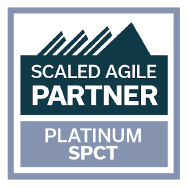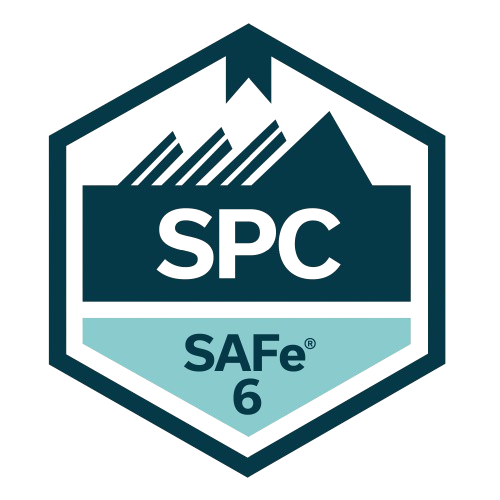

SPC is a reputed certification in the software industry. If you are an implementing SAFe Practice Consultant, you can be an asset to the company. For this, you need to attend a 4-day training and on completion of the training, you must clear an exam. Simpliaxis will help the aspirants throughout the training journey and also help them understand the Implementing SAFe (SPC) Certification Exam Format.
Read more...


SAFe® 6.0 Practice Consultant (SPC) Certification Training
Skill you'll gain : SAFe Lean-Agile Mindset, Launching ARTs
32 Hrs|04 days
2K+ Enrolled
Implementing SAFe (SPC) Certification Exam Format
SPC is a reputed certification in the software industry. If you are an implementing SAFe Practice Consultant, you can be an asset to the company. For this, you need to attend a 4-day training and on completion of the training, you must clear an exam. Simpliaxis will help the aspirants throughout the training journey and also help them understand the Implementing SAFe (SPC) Certification Exam Format.
Read more...


SAFe® 6.0 Practice Consultant (SPC) Certification Training
Skill you'll gain : SAFe Lean-Agile Mindset, Launching ARTs
32 Hrs | 04 days
2K+ Enrolled

15+ years
Experienced Trainers
5
+Trainers
230
+Certified
4.9/5
+Rating
15+ years
Experienced Trainers
5
+Trainers
230
+Certified
4.9/5
+Rating
Implementing SAFe (SPC) Certification Exam Format is provided here to help the participants understand the exam process smoothly. The candidate can take their time and acknowledge how and when to appear for the exam.
| Duration | 120 minutes |
| Number of Questions | 60 |
| Passing Score | 80% |
| Delivery | Web-based, closed book, no outside assistance |
| Access | SAFe community platform after completing the course |
| Pattern of questions | Multiple choice (Single answer) |
| Language | English |
| Level of proficiency | Should be Expert |
| Cost | First attempt included in the course registration fee if taken within 30 days of course completion |
| Exam sections and percentages | Thriving in the Digital Age and Business Agility (4-6%) Becoming a Lean-Agile Leader (12-14%) Establishing Team and Technical Agility (4-6%) Building Solutions with Agile Product Delivery (15-17%) Exploring Lean Portfolio Management (9-11%) Leading the Change (4-6%) Reaching the SAFe® Tipping Point (2-4%) Designing the Implementation (7-9%) Launching an Agile Release Train (4-6%) Coaching ART Execution (5-7%) Enhancing the Portfolio (9-11%) Accelerating to Business Agility (10-12%) |
The above information will help the candidate in Implementing SAFe (SPC) Certification Exam. After completing the training successfully, they can sit for the examination and become a certified professional. As an SPC, you can impart SAFe training and practice throughout the organization.
Also, check:SPC Certification Process
Related Info Page

Advanced SPC Certification Path: A-SPC Certification Process
_1733729901_1740736686_1744364549.webp)
Advanced SPC Certification Path Prerequisites | ASPC Eligibility

Advanced SPC Certification Path Exam Pattern & Format- Exam guide

SAFe 6.0 Agile Product Management (APM) Course Target Audience

SAFe® Agile Product Management (APM) Course Learning Objectives

SAFe® 6.0 Agile Product Management (APM) Course Curriculum

SAFe Agile Product Management (APM) Certification Renewal Cost

SAFe® 6.0 Agile Product Management Certification Process
_1733729901_1740736686.jpg)
SAFe® 6.0 Agile Product Management (APM) Certification Prerequisites

SAFe Agile Product Management Exam Pattern | APM Course exam Format

SAFe APM Certification Cost | SAFe Agile Product Management Course Cost

Leading SAFe Course Target Audience | Who can take SAFe Agilist Training?

Leading SAFe (6.0) Certification Course Curriculum

SAFe Scrum Master Certification Course Learning Objectives
_1733736987.jpg)
SAFe® Scrum Master (SSM) Certification Renewal Cost
_1733736984.jpg)
SAFe 6.0 Scrum Master (SSM) Certification- Eligibility Criteria

SAFe Scrum Master (SSM) Certification Process

SAFe Scrum Master Course Curriculum - Syllabus Details

Leading SAFe Training Cost | SAFe Agilist Certification Cost

Is it Worth to Become a SAFe Scrum Master?

safe scrum master salary, safe certified scrum master salary

Lean Portfolio Management Course Syllabus | Training Curriculum
_1733729589.jpg)
SAFe Architect Certification Prerequisites - Eligibility Criteria

SAFe Architect Certification Exam Format | SAFe Architect Exam pattern
_1733729583.jpg)
SAFe Architect Certification Cost | Registration Price - Fee

SAFe® 6.0 Architect Certification Process

SAFe® 6.0 Architect Certification Renewal Process & Cost Details

SAFe® 6.0 Architect Certification Syllabus

Who Should Take SAFe Architect Certification - Target Audience

SAFe Architect Certification Learning Objectives | Course Agenda

Lean Portfolio Management Certification Cost | Registration Price - Fee

Lean Portfolio Management Certification Renewal Validity & Fee

SAFe Lean Portfolio Management Certification Target Audience

Lean Portfolio Management Certification Eligibility | Prerequisites

SAFe Lean Portfolio Management Exam Format | Exam Details & Pattern

SAFe Lean Portfolio Management Certification Learning Objectives
_1733730028.jpg)
SAFe® 6.0 DevOps Certification Cost - Training, Exam and Renewal cost

SAFe® 6.0 DevOps Practitioner Certification Renewal Process

SAFe DevOps Practitioner Exam Format | SAFe DevOps Exam Pattern

SAFe® DevOps Course Target Audience

SAFe® 6.0 DevOps Certification Curriculum
_1733729920.jpg)
SAFe DevOps Certification Eligibility | Prerequisites

SAFe® 6.0 DevOps Certification Process

SPC Certification Cost | SAFe Practice Consultant Training Cost

Implementing SAFe (SPC) Certification Syllabus | SPC Exam Syllabus

Implementing SAFe (SPC) Certification Renewal Process & Cost

SPC Certification Process | How to Become an SPC (SAFe Practice Consultant)?

Implementing SAFe (SPC) Certification Learning Objectives

Implementing SAFe Certification Eligibility | SPC Requirements - Prerequisites

Who Should Take SAFe Practice Consultant Certification - Target Audience

SAFe Practitioner Course Syllabus | SAFe for Teams Training Curriculum

SAFe Practitioner (SP) Certification Renewal | Process, Validity, Fee
_1733730822.jpg)
SAFe Practitioner Certification Eligibility | SAFe for Teams Prerequisites

SAFe Practitioner Certification Learning Objectives | Course Outcomes

SP - SAFe Practitioner Exam Format | SAFe Teams Course Exam Pattern

Who Should Take SAFe Practitioner Certification - Target Audience

SAFe Practitioner Certification Process | Steps to Gain SP Certification
_1733730816.jpg)
SAFe® for Teams (Certified SAFe® Practitioner) Certification Cost

SAFe RTE Certification Cost | Registration Price

SAFe RTE Certification Renewal | Process, Cost & Validity

SAFe RTE Exam Format | Release Train Engineer Exam Pattern

SAFe RTE Certification Process | How to become an RTE?

SAFe RTE Certification Learning Objectives | Course Agenda & Outcomes
_1733736499.jpg)
SAFe RTE Certification Prerequisites - Eligibility & Requirements

Who can take SAFe RTE Certification: Target Audience

SAFe RTE Course Syllabus | Release Train Engineer Curriculum

Who Can Take SAFe POPM Certification?

SAFe POPM Course Syllabus | Curriculum - Aligned with Scaled Agile

SAFe® 6.0 POPM Certification Renewal | Process - Cost - Expiration

SAFe POPM Certification Process | How to get POPM Certification?

SAFe POPM Certification Learning Objectives | Course Outcomes

SAFe POPM Exam Format | Exam Pattern | Passing Score
_1733729901.jpg)
SAFe POPM Certification Eligibility | Requirements | Prerequisites
_1733729905.jpg)
SAFe POPM Certification Cost | Exam Fee | Registration Price | Renewal Fee

SAFe Agile Certification Renewal | How to Renew SAFe Agilist Certification?

SAFe® Scrum Master Certification Cost - Training, Certification
_1733729573.jpg)
SAFe® Agilist Certification Requirements | SAFe Agile Certification Eligibility

SAFe® Agilist Certification Process | How to become a Certified SAFe Agilist?

SAFe Agilist Salary | Scaled Agile Certified SAFe Agilist (SA) Salary

Advanced SPC Certification Path: A-SPC Certification Process
_1733729901_1740736686_1744364549.webp)
Advanced SPC Certification Path Prerequisites | ASPC Eligibility

Advanced SPC Certification Path Exam Pattern & Format- Exam guide

SAFe 6.0 Agile Product Management (APM) Course Target Audience

SAFe® Agile Product Management (APM) Course Learning Objectives

SAFe® 6.0 Agile Product Management (APM) Course Curriculum

SAFe Agile Product Management (APM) Certification Renewal Cost

SAFe® 6.0 Agile Product Management Certification Process
_1733729901_1740736686.jpg)
SAFe® 6.0 Agile Product Management (APM) Certification Prerequisites

SAFe Agile Product Management Exam Pattern | APM Course exam Format

SAFe APM Certification Cost | SAFe Agile Product Management Course Cost

Leading SAFe Course Target Audience | Who can take SAFe Agilist Training?

Leading SAFe (6.0) Certification Course Curriculum

SAFe Scrum Master Certification Course Learning Objectives
_1733736987.jpg)
SAFe® Scrum Master (SSM) Certification Renewal Cost
_1733736984.jpg)
SAFe 6.0 Scrum Master (SSM) Certification- Eligibility Criteria

SAFe Scrum Master (SSM) Certification Process

SAFe Scrum Master Course Curriculum - Syllabus Details

Leading SAFe Training Cost | SAFe Agilist Certification Cost

Is it Worth to Become a SAFe Scrum Master?

safe scrum master salary, safe certified scrum master salary

Lean Portfolio Management Course Syllabus | Training Curriculum
_1733729589.jpg)
SAFe Architect Certification Prerequisites - Eligibility Criteria

SAFe Architect Certification Exam Format | SAFe Architect Exam pattern
_1733729583.jpg)
SAFe Architect Certification Cost | Registration Price - Fee

SAFe® 6.0 Architect Certification Process

SAFe® 6.0 Architect Certification Renewal Process & Cost Details

SAFe® 6.0 Architect Certification Syllabus

Who Should Take SAFe Architect Certification - Target Audience

SAFe Architect Certification Learning Objectives | Course Agenda

Lean Portfolio Management Certification Cost | Registration Price - Fee

Lean Portfolio Management Certification Renewal Validity & Fee

SAFe Lean Portfolio Management Certification Target Audience

Lean Portfolio Management Certification Eligibility | Prerequisites

SAFe Lean Portfolio Management Exam Format | Exam Details & Pattern

SAFe Lean Portfolio Management Certification Learning Objectives
_1733730028.jpg)
SAFe® 6.0 DevOps Certification Cost - Training, Exam and Renewal cost

SAFe® 6.0 DevOps Practitioner Certification Renewal Process

SAFe DevOps Practitioner Exam Format | SAFe DevOps Exam Pattern

SAFe® DevOps Course Target Audience

SAFe® 6.0 DevOps Certification Curriculum
_1733729920.jpg)
SAFe DevOps Certification Eligibility | Prerequisites

SAFe® 6.0 DevOps Certification Process

SPC Certification Cost | SAFe Practice Consultant Training Cost

Implementing SAFe (SPC) Certification Syllabus | SPC Exam Syllabus

Implementing SAFe (SPC) Certification Renewal Process & Cost

SPC Certification Process | How to Become an SPC (SAFe Practice Consultant)?

Implementing SAFe (SPC) Certification Learning Objectives

Implementing SAFe Certification Eligibility | SPC Requirements - Prerequisites

Who Should Take SAFe Practice Consultant Certification - Target Audience

SAFe Practitioner Course Syllabus | SAFe for Teams Training Curriculum

SAFe Practitioner (SP) Certification Renewal | Process, Validity, Fee
_1733730822.jpg)
SAFe Practitioner Certification Eligibility | SAFe for Teams Prerequisites

SAFe Practitioner Certification Learning Objectives | Course Outcomes

SP - SAFe Practitioner Exam Format | SAFe Teams Course Exam Pattern

Who Should Take SAFe Practitioner Certification - Target Audience

SAFe Practitioner Certification Process | Steps to Gain SP Certification
_1733730816.jpg)
SAFe® for Teams (Certified SAFe® Practitioner) Certification Cost

SAFe RTE Certification Cost | Registration Price

SAFe RTE Certification Renewal | Process, Cost & Validity

SAFe RTE Exam Format | Release Train Engineer Exam Pattern

SAFe RTE Certification Process | How to become an RTE?

SAFe RTE Certification Learning Objectives | Course Agenda & Outcomes
_1733736499.jpg)
SAFe RTE Certification Prerequisites - Eligibility & Requirements

Who can take SAFe RTE Certification: Target Audience

SAFe RTE Course Syllabus | Release Train Engineer Curriculum

Who Can Take SAFe POPM Certification?

SAFe POPM Course Syllabus | Curriculum - Aligned with Scaled Agile

SAFe® 6.0 POPM Certification Renewal | Process - Cost - Expiration

SAFe POPM Certification Process | How to get POPM Certification?

SAFe POPM Certification Learning Objectives | Course Outcomes

SAFe POPM Exam Format | Exam Pattern | Passing Score
_1733729901.jpg)
SAFe POPM Certification Eligibility | Requirements | Prerequisites
_1733729905.jpg)
SAFe POPM Certification Cost | Exam Fee | Registration Price | Renewal Fee

SAFe Agile Certification Renewal | How to Renew SAFe Agilist Certification?

SAFe® Scrum Master Certification Cost - Training, Certification
_1733729573.jpg)
SAFe® Agilist Certification Requirements | SAFe Agile Certification Eligibility

SAFe® Agilist Certification Process | How to become a Certified SAFe Agilist?

SAFe Agilist Salary | Scaled Agile Certified SAFe Agilist (SA) Salary
Related Popular Courses

Our privacy policy © 2018-2026, Simpliaxis Solutions Private Limited. All Rights Reserved